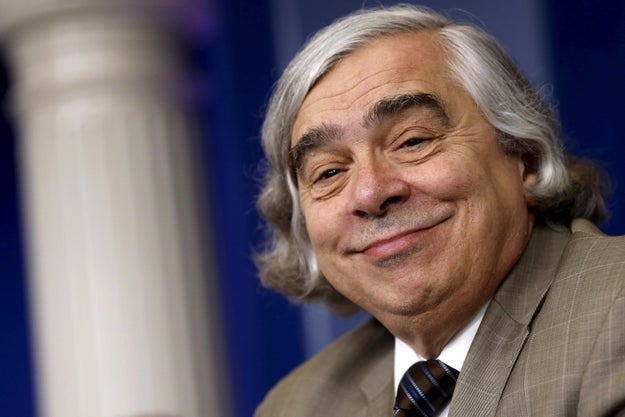[ad_1]

U.S. Energy Secretary Ernest Moniz
Jonathan Ernst / Reuters
Days ahead of the Trump Administration taking power, the US Department of Energy released long-demanded rules on Wednesday to protect its scientists from political harassment. The change was announced today by outgoing energy secretary Ernest Moniz, speaking at the National Press Club in Washington DC.
Until now, the $30 billion Energy Department — which is the biggest US government funder of research in the physical sciences — has lagged in implementing President Barack Obama’s 2009 pledge to ensure that political appointees “should not suppress or alter scientific or technological findings and conclusions.”
The move comes amid fears that the incoming administration will be hostile to science — heightened by a chilling questionnaire sent by the Trump transition team, asking the Energy Department to provide names of all staff involved in climate policy conferences. (The department refused to comply; the transition team later disowned the questionnaire as the unauthorized action of a rogue team member.)
Obama’s 2009 promise on scientific integrity came after widespread complaints about interference during the administration of President George W. Bush. Reports were altered by political appointees, while scientists came under pressure not to speak out on controversial topics. Famously, the leading NASA climate scientist James Hansen alleged that Bush administration officials tried to gag him.
In December 2010, Obama’s science adviser, John Holdren, laid out guidelines for agencies’ scientific integrity policies. But since then, different branches of the federal government have embraced the exercise with varying degrees of enthusiasm.
The Energy Department hasn’t been a star performer. In a 2013 scientific integrity report card compiled by Public Employees for Environmental Responsibility (PEER), which represents scientific whistleblowers, it scored just 25 out of 100, compared to 66 for the National Science Foundation and 55 for the Environmental Protection Agency.
The previous Department of Energy policy, adopted in 2012 and last tweaked in 2014, was little more than a “regurgitation” of Holdren’s memo, Michael Halpern of the Union of Concerned Scientists told BuzzFeed News.
“It's hard to go through all of the components that were missing because there wasn't much there,” he said.
That cursory document has now been replaced with a detailed policy. Among other provisions, it states that Energy Department scientists “are free to discuss their personal opinions on scientific and technical related policies,” provided they don’t represent these views as positions of the US government. It also requires the energy secretary to appoint a senior official as a scientific integrity ombudsperson. Crucially, scientists employed as contractors are explicitly covered.
That’s important, because 16 out of the 17 Department of Energy National Laboratories — which run the nation’s nuclear weapons research, plus work on topics ranging from climate and clean energy to high-performance computing — are managed by universities and other contractors. So their staff are not directly employed by the federal government.
In 2014, that proved a problem for James Doyle, a nuclear security expert at the Los Alamos National Laboratory in New Mexico. Doyle was fired after writing an article for an academic journal advocating nuclear disarmament. Under the previous Energy Department scientific integrity policy, he had little protection against dismissal.
The new policy comes in time for the confirmation hearing for Trump’s nominee for energy secretary, Rick Perry, giving Senators a chance to ask him about his commitment to scientific integrity. Scientists have been alarmed by the choice of the former Texas governor — who has questioned climate science and argued that the Energy Department should be abolished.
Both the Union of Concerned Scientists and PEER say they will fight to keep policies on scientific integrity intact.
“Right now our focus is on whether these policies survive a Trump administration,” Jeff Ruch, executive director of PEER, told BuzzFeed News by email.
LINK: Nobel Prize Winners Are Asking Donald Trump To Respect Science
LINK: Climate Science Threatened Climate Scientists Split Over How To Survive Trump
LINK: Scientists And Doctors Are Freaking Out About A President Trump
[ad_2]
